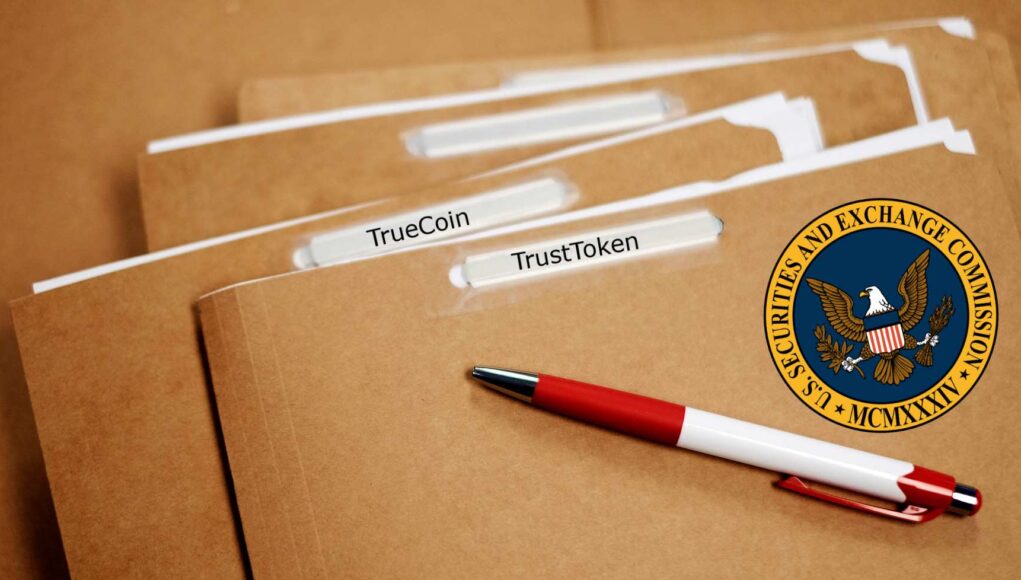The U.S. Securities and Exchange Commission (SEC) has taken significant enforcement action against the crypto firms TrustToken and TrueCoin. Both companies, once seen as pioneers in the stablecoin market, agreed to settle fraud charges related to misleading claims about the financial backing of TrueUSD (TUSD), their flagship stablecoin. This development is part of the SEC’s growing focus on regulating the cryptocurrency industry, particularly stablecoins, which are increasingly seen as critical to the market’s infrastructure.
The Allegations: Misleading Investors About TUSD Backing
Essentially, the SEC alleged that TrustToken and TrueCoin misled investors. They asserted that TUSD was fully backed by U.S. dollars in a 1:1 ratio, reassuring users of the coin’s stability. After all, stablecoins like TUSD are designed to maintain parity with traditional currencies such as the U.S. dollar. However, the SEC’s investigation revealed a starkly different reality. By 2024, they had funneled nearly 99% of the reserves backing TUSD into a speculative offshore fund.
Despite being aware of these risky investments and potential liquidity issues as early as the fall of 2022, TrustToken and TrueCoin continued to market TUSD as fully backed. They assured investors that the stablecoin remained safe, despite growing internal concerns. Their actions exposed investors to significant risks, contradicting their core marketing claims. That cast doubt on the transparency and security of stablecoin reserves in the broader crypto market as well.
Redemption Issues and Investor Impact
The SEC further disclosed that TUSD operations had been transferred to an offshore entity by March 2022. The funds meant to back the stablecoin were no longer held in U.S. dollars or equivalent assets. Instead, most of these funds were directed into a high-risk offshore investment fund, jeopardizing the ability to redeem TUSD for its advertised value.
In 2023, these issues began to surface publicly when TUSD experienced several de-pegging events. During these events, its value dipped below the $1 mark. The incidents were linked to the underlying instability of the reserves, raising alarms within the crypto community and among regulators. At the time, TrueCoin and TrustToken claimed to be addressing these problems. However, the SEC’s findings show that both companies continued to make false assurances to investors, further worsening the situation.
Settlement with the SEC
As part of the settlement, TrustToken and TrueCoin have agreed to pay civil penalties of $163,766 each. TrueCoin is also required to disgorge $340,930 along with prejudgment interest. The companies settled the case without admitting or denying the charges, a common outcome in SEC enforcement actions. They have also agreed to injunctive relief to prevent future violations of federal securities laws.
This case is notable not just for the financial penalties but also for the legal precedent it sets. The SEC classified the sale of TUSD as involving unregistered securities, pointing to the profit-making opportunities tied to the stablecoin. This aligns with the SEC’s broader strategy of applying securities regulations to certain crypto assets. This strategy has sparked debate in the cryptocurrency industry.
Broader Regulatory Implications
This case highlights the challenges regulators face in maintaining transparency and protecting investors in the rapidly evolving cryptocurrency landscape. Stablecoins have become a fundamental part of the crypto ecosystem. They facilitate trading, lending, and other financial services but are now under increased scrutiny. The SEC’s actions signal that even well-established projects like TUSD are not immune to enforcement if they fail to maintain transparency and adhere to regulatory requirements.
For the crypto industry, this case emphasizes again the importance of clear regulatory guidelines and the need for companies to comply with securities laws when offering digital assets. As the SEC continues to define its regulatory framework for cryptocurrencies, more enforcement actions against stablecoins and other crypto assets are likely on the horizon.
>>> Read more: Coinbase Challenges SEC in Court Over Lack of Crypto Rules
The settlement between the SEC, TrustToken, and TrueCoin sends a strong message to the crypto industry about the importance of transparency, investor protection, and regulatory compliance. While TUSD’s fall from grace highlights the risks associated with stablecoins, the broader market will be watching closely to see how this case impacts future regulatory decisions and the evolving landscape of digital assets.
As stablecoins remain integral to the functioning of the crypto market, ensuring they are backed by transparent and secure reserves is crucial to maintaining investor trust and market stability.
Readers’ frequently asked questions
What specific role did the speculative offshore fund play in the SEC’s case against TrustToken and TrueCoin?
The speculative offshore fund is central to the SEC’s fraud charges against TrustToken and TrueCoin. These companies misled investors by claiming that TrueUSD (TUSD) was fully backed by U.S. dollars or equivalent assets, which would ensure that each TUSD could be redeemed for one dollar. However, the SEC found that by 2024, nearly 99% of the reserves supposedly backing TUSD were placed in a risky offshore investment fund rather than in safe, liquid assets like cash or equivalents. This fund was intended to generate higher returns but ultimately exposed TUSD holders to substantial risk without their knowledge. The companies continued promoting TUSD as fully backed, even though they knew about the internal problems with liquidity and redemption by late 2022.
What does this case imply for the classification of stablecoins like TrueUSD as securities?
The SEC’s case against TrustToken and TrueCoin reinforces its position that certain digital assets, including stablecoins, may be classified as securities. According to the SEC’s findings, TUSD was sold with profit-making opportunities. Hence, the companies’ activities met the criteria outlined in the Howey Test – a legal framework used to determine whether a transaction qualifies as an “investment contract” and therefore a security. Specifically, investors were led to believe that they were participating in a common enterprise (TUSD) with the expectation of profit (from the stability and backing of the coin). This classification of TUSD as a security underlines the growing scope of the SEC’s oversight in crypto markets. It also suggests that other stablecoins with similar structures could be subjected to securities laws, too.
How will this settlement affect the broader stablecoin market?
The settlement between the SEC, TrustToken, and TrueCoin has broader implications for the stablecoin market. The case highlights the need for transparency on the backing of stablecoins. They must comply with existing securities laws. Stablecoins play a crucial role in the cryptocurrency ecosystem, facilitating trading, lending, and financial transactions. However, discovering that TUSD reserves were improperly managed may lead to greater regulatory oversight of other stablecoins, especially regarding reserve transparency and stability assurances. This could prompt stablecoin issuers to adopt more stringent practices to avoid regulatory actions. Ultimately, this can make the market safer for investors but potentially limits the issuers’ flexibility in managing their reserves.
What Is In It For You? Action Items You Might Want to Consider
Evaluate the Stability and Transparency of Stablecoins Before Trading
Given the SEC’s findings on TUSD’s misleading claims about its backing, it’s crucial to scrutinize any stablecoin’s reserve practices before incorporating them into your portfolio. Look for assets with clear, independently audited reserves, and avoid stablecoins tied to offshore funds or speculative assets. This will help minimize your exposure to sudden de-pegging events and liquidity issues, which can severely impact your capital.
Stay Updated on Regulatory Changes Affecting Stablecoins
The SEC’s actions against TrustToken and TrueCoin could lead to tighter regulatory oversight of the stablecoin market. As a trader, keep an eye on new rules or enforcement actions targeting stablecoins and other crypto assets. Regulatory shifts can significantly affect liquidity, trading pairs, and market perception of specific coins. That influences their short-term and long-term performance.
Diversify Stablecoin Holdings to Mitigate Risk
Given the risks highlighted in this case, including the possibility of misleading claims about backing, it may be wise to diversify your stablecoin holdings across multiple issuers. While stablecoins are designed to maintain parity with traditional currencies, issues with reserves can lead to temporary or prolonged losses in value. Spread your holdings across multiple stablecoins with verified backing. It will reduce the risk of a single issuer’s failure affecting your entire portfolio.











[…] >>> Read more: SEC Settles with TrustToken and TrueCoin Over Fraud Allegations […]